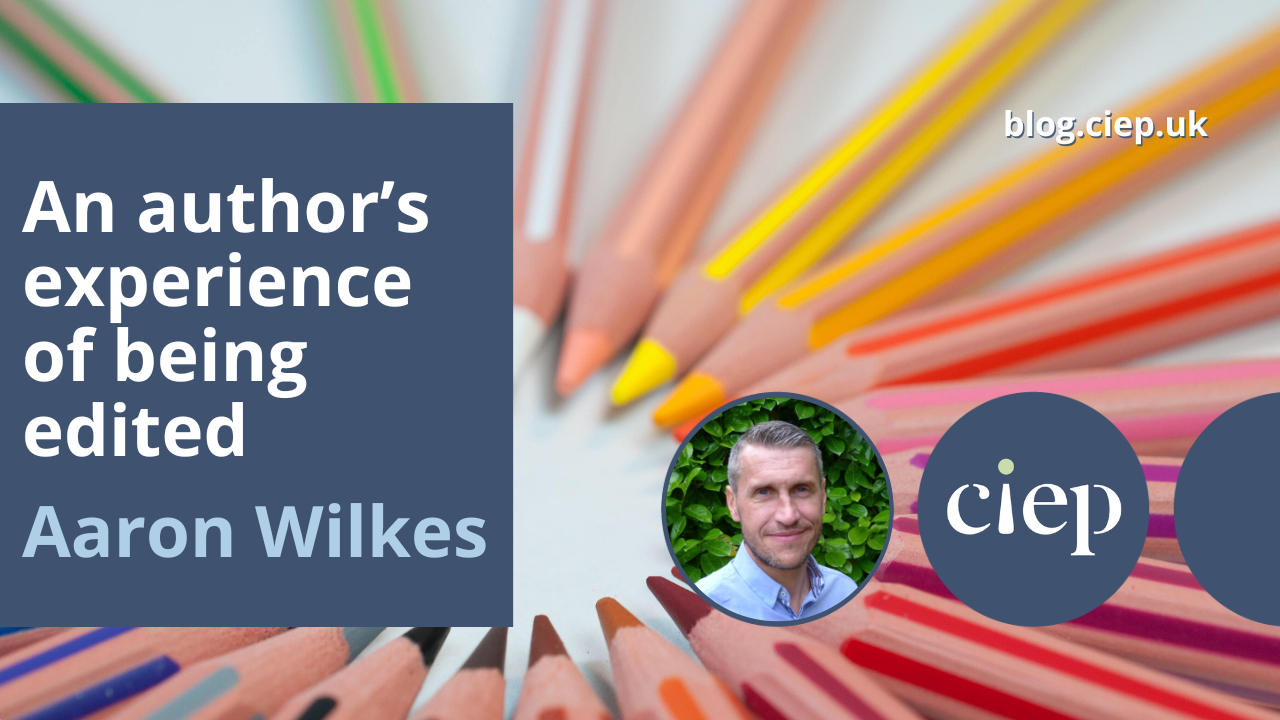Aaron Wilkes is a prolific school textbook author. In this blog post, he talks about his experiences of being edited and shares the things that have made the editing process easier for him.
I’ve been in the ‘writing game’ for quite some time now, perhaps nearly 20 years, and I’ve been either the sole author, co-author or ‘series editor’ for over 80 student textbooks, revision guides and online resources, from Key Stages 1 to 4. I’m a history teacher by trade – it was my full-time job up to a few years ago – but, in my spare time, I’ve written for Stanley Thornes (that then became Nelson Thornes), Folens and, most recently (for the last ten years), Oxford University Press. Over the years, I’ve worked with lots of editors, both in-house and freelance, and thought I’d share my experiences of being edited and how some editors have really helped make the whole editing process easier (or in some cases, harder).
Friendly introductions
Firstly, it’s just really nice to get a friendly introductory email. I don’t expect War and Peace, but a simple ‘Hi, I’m … and I’ll be working on … etc, etc’ with a phone number is always appreciated. A quick chat over the phone can be lovely too. In fact, a quick chat is often worth its weight in gold because it gives me a chance to put a ‘voice’ to the comments and feedback I’ll get.
Now I completely understand that both writers and editors are really busy, but sometimes it can be helpful to just have a 10–15-minute conversation about things. I’m sure we’ve all received text messages that we’ve looked at and thought ‘I’m not sure how to take that’. It can be the same with feedback on manuscripts. Depending on the day I’m having, the feedback can sometimes be taken ‘wrongly’. This is where an initial chat on the phone can help, just so I feel more familiar with the editor and ‘get them’ a bit more. Writing is quite a lonely profession – you tend to sit on your own, in the quiet, for long periods of time – and when it comes to making revisions, the offer of a chat is sometimes really nice.
I’ve been working with an editor who is new to the team at OUP and she always signs off her emails by saying if you don’t want to spend lots of time answering via email, just give me a call and we’ll chat things through. Most of the time I respond by email, but sometimes it’s really nice to talk. Open lines of communication are a really important part of the process.
Solution-focused feedback
Another part of the process that I really value is the way I get my feedback. Personally, I don’t mind at all if an editor makes minor changes (though I still want Track Changes to show me what they are!). I write lots of words that make up lots of sentences, so will sometimes mess up the way I structure a sentence, or simply ‘overwrite’ something that can be expressed more succinctly. The editors I find easiest to work with simply fix these problems with minimal fuss. I like it when that happens – I trust the editor to get that right. And when I’ve had a conversation with the editor already, when I’ve chatted on the phone, it makes me value their changes more because I think that they understand me a little.
With slightly larger changes, in my opinion, the best editors are the ones that help you out! They throw me a bone when something reads a little ‘off’. I might have pored over the paragraph for over an hour, and in my eyes I’ve made it as good as it can be. If an editor thinks there should be a change to the ‘thrust’ or shape of the paragraph (or perhaps the whole spread itself), it is so incredibly helpful if they help out a little and shape it how they want to. It’s so nice when I read in the comments at the side of a Word document, ‘I think this might read a little better like this: [and then they construct, or part-construct the text] – have a look and let me know what you think.’ Most times I will just accept these changes.
Feedback that doesn’t overwhelm
When I get an edited manuscript back it’s usually accompanied by a load of mark-ups and comments via Track Changes. If there are loads of comments and changes – and the manuscript is awash with different coloured text where revisions have been made – it can be a little daunting (and demoralising). In recent years, I have asked my editors to clean it up a little before I get it back. Especially if the manuscript has gone to two or more people, and they’ve all made comments – do I really need to see the whole discussion? As I mentioned before, I’m happy for the changes to be made and sent back to me for a final ‘yes’ (it’s nearly always ‘yes’).
In a similar vein, feedback from OUP arrives in two forms – and I like it. The manuscript is edited and I get feedback via comments and Track Changes. All good. Then, at the next stage (when the first proof is ready), I get a ‘queries grid’, which is a Word document that acts as a conversation between reviewer, editor(s) and me. This is the part of the process that is sometimes done over the phone, and is where the quality of the relationship between editor and author is important. These grids are used to track decisions made together about queries.
Concrete examples
Another particularly powerful idea is to actually show an author the direction you want them to go in. I’ve just undertaken a new project in which the style of writing is a little different to what I’m used to. The editor simply exemplified what was required – she gave a WAGOLL. This is something that most teachers are familiar with – What A Good One Looks Like. I think this is key for getting the best out of an author – model what you want them to do.
I think this is especially important with new authors. I regard myself as a bit of an ‘old lag’ now. It’s never my first rodeo when I get a new book contract, but I know (because they’ve told me) that new authors find it really helpful to be shown what needs to be done. I’m not entirely sure that sending them a ten-page document covering what needs to be included is particularly helpful – it’s just a ‘wall of words’ – so in my experience the most productive new author meetings are the ones where you sit round a table (or on Teams) and have an experienced author come up with five, eight or ten top tips or ‘golden rules’ for writing spreads. I’ve done this several times with new author teams where I’ve sat with them and explained how a spread is formed and how the process works for me.
I enjoy and value working with editors, and have always embraced the process. I’ve become really friendly with several editors, and have even phoned them to pick their brains on little issues that have cropped up when working on other projects. To their credit, they have always been most helpful, and I have returned the favour several times when I’ve been contacted by editors who wanted a chat about something that they were struggling to get their head around. I realise that every editor–author relationship will be different, but I hope the things that have helped the editing process to go more smoothly for me might help other editors and writers out there too.
About Aaron Wilkes
 Aaron Wilkes has over 20 years’ experience in teaching history and writing school textbooks. During this time he’s written or contributed to over 80 textbooks, revision guides and online resources. He leads the PGCE Secondary History course at the University of Warwick and is the co-creator and owner of the online history journal practicalhistories.com.
Aaron Wilkes has over 20 years’ experience in teaching history and writing school textbooks. During this time he’s written or contributed to over 80 textbooks, revision guides and online resources. He leads the PGCE Secondary History course at the University of Warwick and is the co-creator and owner of the online history journal practicalhistories.com.
 About the CIEP
About the CIEP
The Chartered Institute of Editing and Proofreading (CIEP) is a non-profit body promoting excellence in English language editing. We set and demonstrate editorial standards, and we are a community, training hub and support network for editorial professionals – the people who work to make text accurate, clear and fit for purpose.
Find out more about:
Photo credits: pencils by Agence Olloweb on Unsplash, woman on phone by Vlada Karpovich, typewriter by Suzy Hazelwood, both on Pexels.
Posted by Harriet Power, CIEP information commissioning editor.
The views expressed here do not necessarily reflect those of the CIEP.



